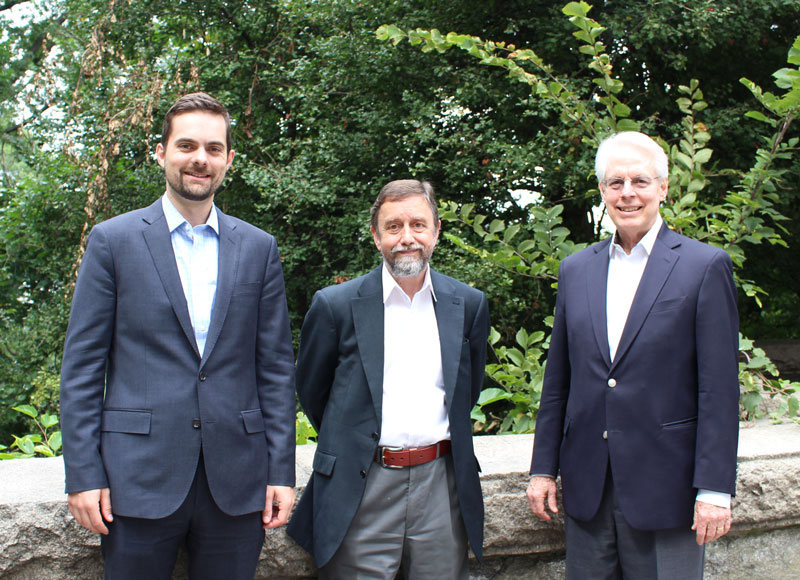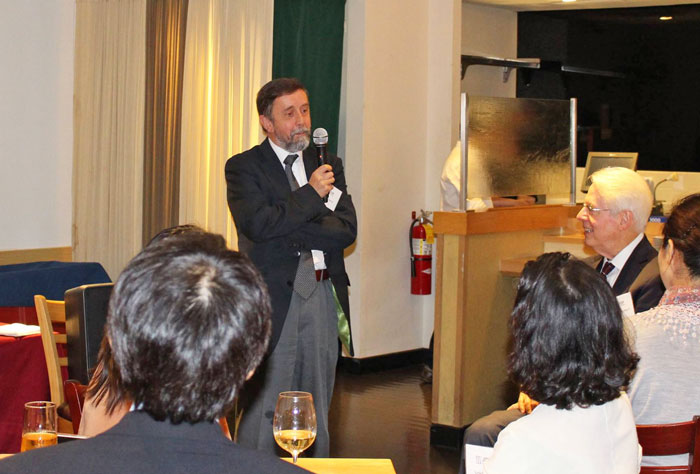Interview with ICU Vice President Mark Williams

Last month, Dr. Mark Williams assumed the post of Vice President for International Academic Exchange at ICU. We had the privilege of interviewing him on September 15th, when he visited New York to attend JICUF’s Board of Trustees meeting.
JICUF: Please tell us about yourself. Where were you born and raised? What led you to become a specialist of Japanese literature?
MW: I was born in Oxford. My life had no connection with Japan until I was 18. I was going to interview for university to study French and German. But one week before the interview, I was at a pub with my friends and met a lonely-looking Japanese man. After half an hour of conversation, my life was transformed and I decided to change my major to Japanese studies.
JICUF: What about that meeting inspired you?
MW: It was not a stimulating conversation at all, but I’d never thought about Japan before that. I ended up studying Japanese at Oxford University. The textbook was Genji Monogatari. There were no native Japanese professors, but I studied not only the Japanese language but also the history, economics and politics of Japan. We spent six weeks at Nanzan University. When I graduated, I could speak bungotai (literary style) Japanese. But there was no employment in the UK, so I decided to go on JET (Japan Exchange & Teaching Program). I was employed by the Gunma Prefecture Board of Education as an assistant language teacher. This is when my Japanese switched from bungotai to Joshuben (Gunma dialect).
After two years on JET, I went freelance and taught English part-time in several schools, including ICU High School. This was in 1981. At this time, I took the advanced Japanese language course at ICU as a kenkyuusei (research student).
Two life-changing things happened at ICU. First, I met my wife on bakayama. Second, I decided to devote my life to Japanese Studies.
I decided to go to the U.S. to pursue a doctorate at UC Berkeley. I spent five years there as a PhD student, and one of my professors was Endo Shusaku’s number one translator. I wrote my thesis on post-war Christian writers in Japan. While doing research, I went back to Japan for a year.
After completing my PhD, I got a job in the UK. It was to establish a new Japanese Studies program at Leeds University. Leeds was famous for Chinese Studies, and I initially taught Japanese in the Chinese Studies Department. However, I took this job on the condition that they would change the name of the department to the East Asian Studies Department and set up a new program for Japanese Studies, which they did.
At the time, Leeds was looking for partner universities in Japan for one-year student exchange programs. The President of Leeds asked me what possibilities there were, and I recommended ICU and Kansai Gaidai. They became partners in 1989.
In Leeds, Japanese is the number one foreign language major today, even more popular than French.
JICUF: Is that so? How many students study Japanese?

MW: About 45 students study Japanese each year, and five students go to ICU.
In the 2000s, there was another big event. The then Prime Minister Tony Blair decided that there was a national crisis in four languages – Chinese, Japanese, Russian and Arabic, and allocated 25 million pounds into developing these language programs.
Universities had to apply as a consortium, and Leeds and Sheffield, which were the center of Japanese studies, applied to become the center for East Asian Studies. The bid was successful, and the White Rose East Asia Centre was established, combining both Japanese and Chinese studies.
Tokyo University of Foreign Studies (Tokyo Gaigodai) was another partner of Leeds University. Dr. Mineo Nakajima, who was the President of Gaigodai at the time, was asked by the then Prime Minister Koizumi to take over the former Minnesota State University campus in Akita Prefecture to create Akita International University. Dr. Nakajima became its President, and invited me to join the Advisory Board. I subsequently agreed to take on the full-time job of Vice President for Academic Affairs and took a three-year leave from Leeds.
My wife and daughter lived in Tokyo, where my daughter attended the American School in Japan (ASIJ).
During my tenure at Akita, the Ministry of Education, Culture, Sports and Technology (MEXT) launched the Top Global University project. I helped Akita’s bid for this project, and it was successfully selected as one of the Top Global Universities. I met Junko (President Hibiya) while working on this, and resigned from Leeds to join ICU this fall.
JICUF: What is the role of the Vice President for International Academic Exchange?
MW: This is a completely new position, and there are no predecessors. A part of my job is to define the role of the VPIAE, and I do have a wishlist.
One of my main jobs is to oversee ICU’s student exchange program. Currently ICU is servicing 90 partner institutions. I will be responsible for creating new partners, not just for student exchange but for faculty academic exchange as well. I will also be exploring research collaboration between ICU and overseas institutions.
My goal is to build up ICU’s reputation both as a teaching institution and a research institution.
JICUF: What will be your priority? What are you most excited to work on?
MW: One thing I would like to do is to define the term “global jinzai (human resources).” What does that mean? It means different things to different people. There is a tendency in Japan to think of it as someone who is able to do business in English, which is a large part of it, but not all. After all, not every English-speaking person is a “global jinzai.” It is not about being bilingual but multicultural and understanding different cultures. ICU is in the right position to foster such personnel.
JICUF: What are your three favorite Japanese books?
MW: Endo Shusaku’s “Chinmoku (Silence),” Natsume Soseki’s “Kokoro,” and Shimao Toshio’s “Shi no Toge.”
JICUF: Lastly, what do you like to do in your free time?
MW: Skiing (I like most sports, both watching and participating), reading and listening to music.
JICUF: Thank you very much for speaking with us. We look forward to working closely with you in the future!



